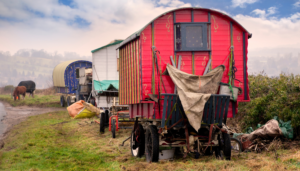 The European Union Fundamental Rights Agency (FRA) has published a bulletin – “Coronavirus pandemic in the EU – Impact on Roma and Travellers” – which examines the effect of the global pandemic and the subsequent economic and social challenges on Romani and Travellers’ communities. The main challenges noted in the bulletin are:
The European Union Fundamental Rights Agency (FRA) has published a bulletin – “Coronavirus pandemic in the EU – Impact on Roma and Travellers” – which examines the effect of the global pandemic and the subsequent economic and social challenges on Romani and Travellers’ communities. The main challenges noted in the bulletin are:
- Lockdown – entire Roma and Traveller communities faced stricter lockdown as precautionary measures, even before there were any confirmed infections.
- Housing – many live in overcrowded households with no access to running water. This makes physical distancing or washing hands very difficult, and put Roma and Travellers at higher risk of contracting the disease.
- Employment – lockdown left street vendors and those with precarious contracts unemployed. As many Roma and Travellers were not part of the formal economy before the pandemic, they cannot access support or claim welfare benefits.
- Poverty – the loss of jobs increased poverty and the risk of malnutrition, which was already high before the pandemic.
- Healthcare – in some countries, only half of Roma and Travellers have health insurance. Moreover, many face discrimination when accessing healthcare.
- Education – already before the pandemic, most Roma and Traveller children were early school leavers. Now, many do not have internet access nor computers, so they cannot take part in online learning when schools close.
- Hate speech– hate speech and discrimination against Roma and Travellers increased during the pandemic, as they were blamed for spreading the virus.
Following this assessment, FRA stresses that:
- Roma and Travellers must have equal access to all mainstream poverty reduction, employment generation and other social inclusion schemes.
- Health and education mediators, who provide basic services in Roma communities during the pandemic, need adequate resources and support to assist people in need, especially since the number of infections is rising again across the EU.
- Member States need to fight anti-Gypsyism and prejudice against Roma and Travellers. Their communities are often presented as a risk to the general population while in fact they are more at risk themselves because of the conditions they live in.
For more information, please consult the full text of the report.